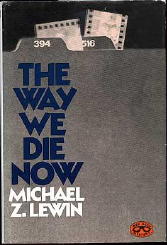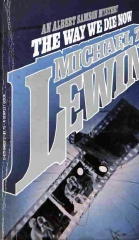Mon 10 Sep 2007
TMF Review: MICHAEL Z. LEWIN – The Way We Die Now.
Posted by Steve under Authors , Characters , ReviewsNo Comments
MICHAEL Z. LEWIN – The Way We Die Now.
Putnam’s, hardcover, 1973. Paperback reprints: Berkley, 1979; Harper Perennial, 1984; Mysterious Press, June 1991.

Albert Samson is a rather sensitive soul to be a private detective. Not only that, but the only reason that he gets this case is because he’s the cheapest one listed in the Indianapolis telephone directory.
No wisecracks, please. The key word here is “sensitive”, not “cheap,” and Indianapolis has enough crimes and other divorce work to keep more than a couple of private eyes on the street. This isn’t a divorce case, however. A troubled Viet Nam veteran with a history of psychiatric treatment is in jail, accused of murder. Samson, hired in quiet desperation by the man’s wife, has only one question: With his past record, why was this innocent Childe Ralph hired as an armed guard?
I liked the homey Midwestern atmosphere, and I liked Albert Samson. However, it seems only fair to point out that his slow, casual approach to the investigation can be awfully frustrating to a reader who has a lot of unanswered questions. Still, it’s the police who are guilty of taking the simple explanation, while Samson’s appraisal of Ralph Tomanek as one of the children of the world convinces both himself and the reader very early on that the job he took as a watchman was but a part of a much broader scheme.
In short, good characters nicely scaled down to earth, in a plot stretched precariously thin. [B minus]

[UPDATE] 09-10-07. I didn’t happen to mention that this was Samson’s second case, the first being Ask the Right Question (Putnam’s, 1971), which was also Lewin’s first mystery novel. Reading through the review right now, almost thirty years later, I can’t say that the story comes back to me any more than what’s there and with no more insight than you can gather for yourself. The phrase “homey Midwestern atmosphere” evokes more feeling in me than any of the specific details. That must mean something, I’ve been telling myself, and I’m sure it does.
I’ll have more to say about the author, Michael Z. Lewin, in a review I wrote much more recently. If you don’t see it here next, it’ll show up soon.